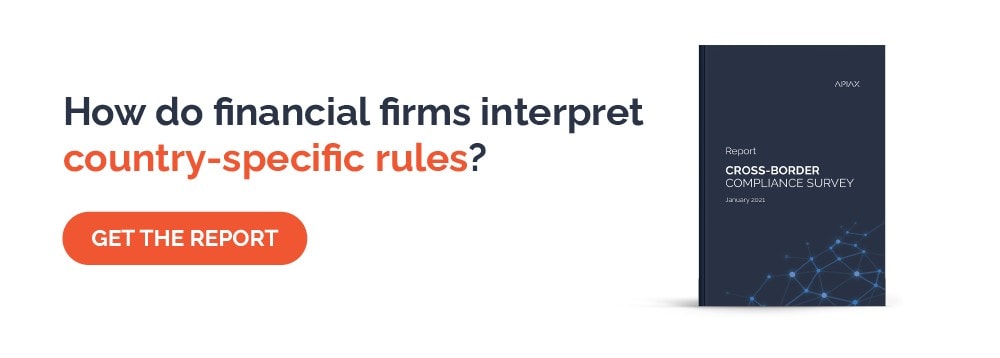The rate of regulatory change has long passed overwhelming levels for financial institutions, which particularly impacts providing financial services on a cross-border basis. Our new study highlights how much of a competitive issue cross-border compliance has become.
Financial institutions that want to serve a global client-base need to cope with a growing list of ever-changing country-specific regulations. Moreover, they are also required to actively manage what is commonly called a cross-border framework.
A cross-border framework requires regulatory guidance (policies, manuals etc.), respective compliance training and monitoring. All these requirements make offering financial services in multiple jurisdictions an entanglement of competing requirements and restrictions.
In our study, we surveyed over 40 financial institutions to explore how they currently cope with cross-border compliance, as well as their plans to tackle the pain points stalling their growth.
Offering services across borders
In a globalised world where clients are mobile, cross-border compliance is an inescapable issue for all financial institutions servicing clients abroad. Especially for any bank or wealth manager wishing to be a professional player in the high-net-worth space. 93% of our respondents provide services and products in multiple countries, with 51% of them dealing with clients in over 20 countries.
55% of firms actively market their services to clients abroad while 45% provide their services on a cross-border basis only based on a client request (passive offering). Moreover, over a third (36%) of the most global firms—which operate in over 20 countries—offer all their services and products only on a passive basis (in some countries referred to as reverse-solicitation).
Setbacks wealth managers face when dealing with regulations
Banks and wealth managers are not known for letting business fall through the cracks. Despite their wishes to help their clients grow, they can often find themselves trapped amidst the complexities of ever-changing country-specific regulations.
Difficulties begin with the fact that the majority (67%) of respondents operate under numerous banking entities. With each entity being separately licensed in its respective country, this adds an additional layer of complexity. Furthermore, 35% admit they struggle to provide clear do’s and don’ts, whilst 19% cite training concerns. This shows that it is often left to client advisors to unpick how local licences, offering exemptions, country-specific requirements and the restrictions of their employers are interlinked.
Results show that 82% of client-facing employees still have to pore over paper-based manuals to know what they can offer, often with separate weighty manuals for licenced and non-licenced activities. In addition, 91% of our respondents update these manuals in an inefficient manual process via memos, emails and calls with their respective providers.
Emerging compliance challenges
Though the costs of maintaining immaculate compliance across borders can be incredibly heavy and fall on various elements of the business, the risks afford no margin for error.
The pandemic has unfortunately created yet more danger zones as clients and advisors are displaced from their usual home ground. This has created new constellations of physical location, nationality and domicile rules that are very easy to amiss. Too often cross-border compliance frameworks were centred around traveling client advisors, disregarding the risks of virtual cross-border client meetings. In fact, only 32% of respondents admit to taking the necessary steps to cover virtual client meetings.
On the other hand, the survey also shows that 35% of financial institutions apply rules dynamically depending on the context of the cross-border scenario in question; 21% have investment proposals automatically checked for country-specific restrictions; and 9% source compliance information via an app. Looking into the very near future, we see a digital revolution in approach.

Overcoming challenges with digital compliance solutions
As perhaps expected, almost all (around 96%) of our respondents see the advent of digital tools for ensuring cross-border compliance as an important development. This enthusiasm is certainly translating into investment plans too.
A full 31% of respondents aim to integrate regulatory restrictions into their workflows, likely through a compliance app. In what is always a highly competitive market for talent, asking staff to thumb through reams of paper is now starting to look very passé indeed.
As competitive pressures really start to bear down on the industry, what constitutes a profitable use of time and resources can only come into greater focus. As such, firms’ means of coping with cross-border frameworks is set to become a burning competitive issue.
Digital compliance solutions like a regulatory compliance software, not only allow financial institutions to get faster answers to their regulatory questions, but frees up resources so that they can focus on customer experience and leverage their competitive advantage. Many leading financial institutions are already showing that RegTech is the path to minimising risks and maximising opportunities.

